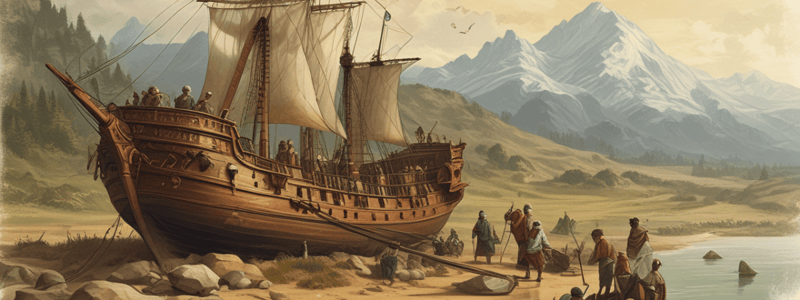Podcast
Questions and Answers
What is the primary focus of the study of history?
What is the primary focus of the study of history?
- Comparing different cultures and societies
- Analyzing past events, people, and cultures (correct)
- Examining current events and societies
- Predicting future cultural and economic developments
Which approach to studying history involves examining events through specific themes?
Which approach to studying history involves examining events through specific themes?
- Biographical approach
- Thematic approach (correct)
- Chronological approach
- Analytical approach
What is the skill of understanding the perspectives and experiences of people in the past?
What is the skill of understanding the perspectives and experiences of people in the past?
- Source analysis
- Chronology
- Critical thinking
- Historical empathy (correct)
What type of historical source is an original document or artifact from the past?
What type of historical source is an original document or artifact from the past?
What period of history examines civilizations from ancient times to the fall of the Roman Empire?
What period of history examines civilizations from ancient times to the fall of the Roman Empire?
Study Notes
History in Social Studies
Definition and Scope
- History is the study of past human events, societies, and cultures.
- It involves the examination of past events, people, and cultures to understand their significance and impact on the present.
Importance of History in Social Studies
- Helps understand the present and future by analyzing the past.
- Provides context for understanding cultural, social, and economic developments.
- Enables individuals to learn from past successes and mistakes.
- Fosters critical thinking, empathy, and understanding of different perspectives.
Approaches to Studying History
- Chronological approach: Organizes events in a sequential timeline.
- Thematic approach: Examines historical events and processes through specific themes, such as politics, economy, or culture.
- Biographical approach: Focuses on the lives and experiences of individuals in the past.
Historical Skills
- Critical thinking: Analyzing and evaluating historical information to form conclusions.
- Source analysis: Examining and interpreting primary and secondary sources.
- Historical empathy: Understanding the perspectives and experiences of people in the past.
- Chronology: Understanding the sequence of events and their relationships.
Types of Historical Sources
- Primary sources: Original documents, images, or artifacts from the past, such as diaries, photographs, or artifacts.
- Secondary sources: Interpretations or analyses of primary sources, such as textbooks, articles, or documentaries.
Historical Periods and Eras
- Ancient history: Examines civilizations from ancient times to the fall of the Roman Empire.
- Medieval history: Covers the period from the fall of the Roman Empire to the Renaissance.
- Early modern history: Encompasses the period from the Renaissance to the Industrial Revolution.
- Modern history: Examines the period from the Industrial Revolution to the present.
Key Concepts in History
- Cause and effect: Understanding the relationships between events and their consequences.
- Change and continuity: Analyzing how societies and cultures have changed or remained the same over time.
- Cultural exchange: Examining the exchange of ideas, goods, and cultures between different societies.
- Historical significance: Evaluating the importance and impact of historical events and processes.
History in Social Studies
Definition and Scope
- History involves the study of past human events, societies, and cultures to understand their significance and impact on the present.
Importance of History
- Analyzing the past helps understand the present and future.
- History provides context for understanding cultural, social, and economic developments.
- It enables individuals to learn from past successes and mistakes.
- History fosters critical thinking, empathy, and understanding of different perspectives.
Approaches to Studying History
- Chronological approach organizes events in a sequential timeline.
- Thematic approach examines historical events and processes through specific themes.
- Biographical approach focuses on the lives and experiences of individuals in the past.
Historical Skills
- Critical thinking involves analyzing and evaluating historical information to form conclusions.
- Source analysis examines and interprets primary and secondary sources.
- Historical empathy involves understanding the perspectives and experiences of people in the past.
- Chronology involves understanding the sequence of events and their relationships.
Types of Historical Sources
- Primary sources include original documents, images, or artifacts from the past.
- Secondary sources are interpretations or analyses of primary sources.
Historical Periods and Eras
- Ancient history examines civilizations from ancient times to the fall of the Roman Empire.
- Medieval history covers the period from the fall of the Roman Empire to the Renaissance.
- Early modern history encompasses the period from the Renaissance to the Industrial Revolution.
- Modern history examines the period from the Industrial Revolution to the present.
Key Concepts in History
- Cause and effect involves understanding the relationships between events and their consequences.
- Change and continuity involve analyzing how societies and cultures have changed or remained the same over time.
- Cultural exchange examines the exchange of ideas, goods, and cultures between different societies.
- Historical significance involves evaluating the importance and impact of historical events and processes.
Studying That Suits You
Use AI to generate personalized quizzes and flashcards to suit your learning preferences.
Description
Understanding the significance of history in social studies, its impact on the present and future, and its role in shaping cultural, social, and economic developments.




